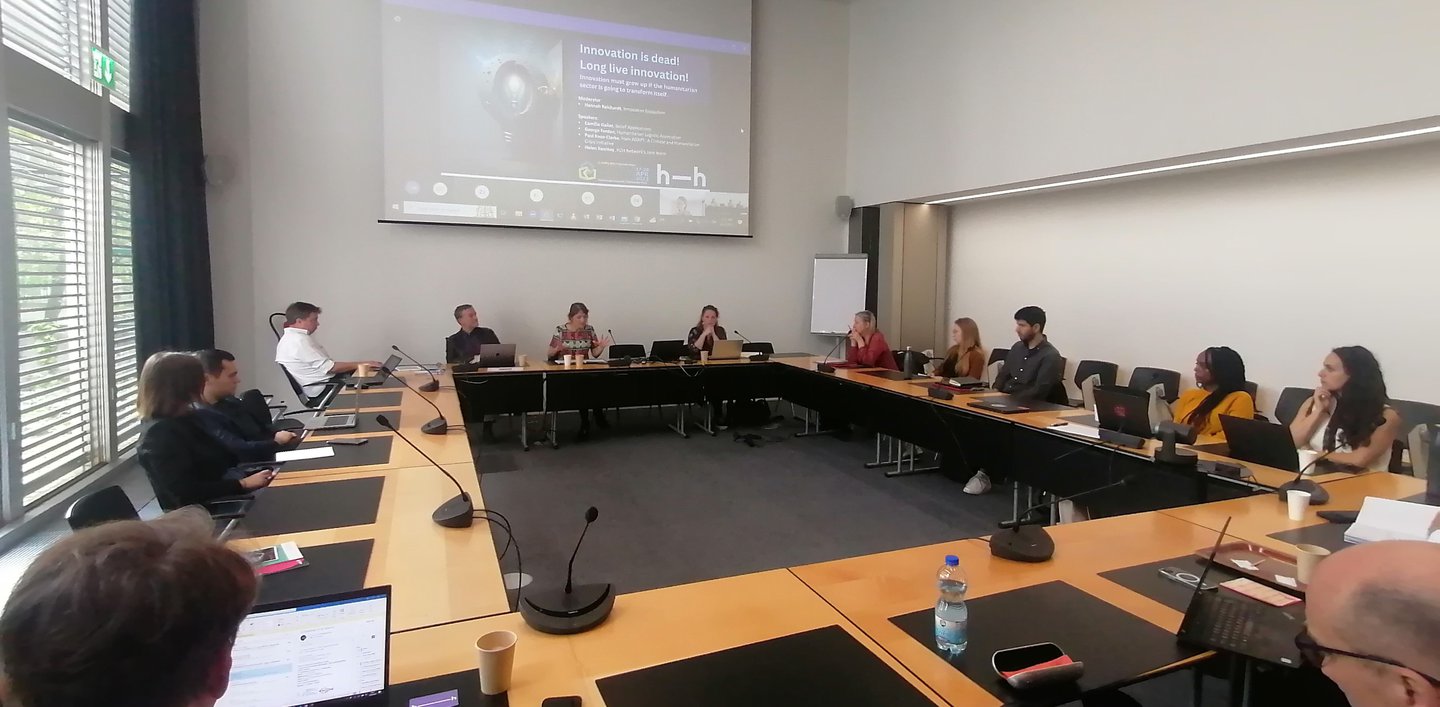Innovation is dead! Long live innovation?
Blog
Event
H2H Network's news
Aug 07 2023

What does the aid sector need to transform itself?
Too often, “innovation” in the humanitarian sector has failed to live up to its big promise to solve intractable problems and drive vital improvements. We explored the reasons for this in two H2H Network panel discussions, “Innovation is dead! Long live innovation?” at the Humanitarian Networks and Partnership Week (HNPW) 2023 and the 2023 Humanitarian Leadership Conference.
The panels gathered participants from the USAID-funded H2H Innovation Accelerator programme: Camille Gallet and Raphaël Bonnaud from Relief Applications; Véronique de Geoffroy from Groupe URD; Paul Knox Clarke from ADAPT Initiative; George Fenton and Andrew Lamb from Humanitarian Logistics Association; Helen Kearney from the H2H Team; as well as Hannah Reichardt, the programme’s innovation coach.

The H2H Innovation Accelerator programme was launched in December 2022, when three H2H Member initiatives that focused on tackling complex problems were selected to receive a combination of coaching and funding. Panellists reflected on diverse innovations that support the humanitarian system through the lens of what was learned in the programme. Here are the five key takeaways:
1. Innovation in the humanitarian system needs to focus on transformation rather than simply applying new tools and technologies.
“Innovation has been lost in translation, and what humanitarian organizations need to do today is not necessarily innovate but transform, especially towards a digital transformation journey. This journey is not a linear path.” – Camille Gallet, Relief Applications
2. The idea of how we work is fundamental, but something we don't spend a lot of time thinking about. We need to ask ourselves if the change we want to see is demonstrated in our values and the way we work.
“We’re not going to make things different by doing them the same. The system of humanitarian action is perfectly designed for the way it works now, and when we are trying to do anything differently, we start seeing all of the things that keep it rigidly, exactly the way it is.” – Paul Knox-Clarke, ADAPT
3. There is a need for new ways of working (and this is one of the reasons the H2H Network exists). H2H Members originally came together because of how they were working, bringing services into the system or supporting the system to work more effectively, and they collaboratively tackle the shared challenges in the sector.
“Coming together in groups to tackle complexity, instead of staying in silos in-house, enables us to get a much better picture of the reality of the situation.” – Helen Kearney, H2H Network
4. Today’s humanitarian challenges require complex transformations in response – not simply a new product or service. The panellists detailed how the issues they are seeking to address required them to push beyond existing practices and develop new ways for multiple parties to work together. The messy and nonlinear pathway to change may be part of the reticence of humanitarian organizations to contribute to the transformation. As described by Hannah and Dan McClure in their overview of the H2H Innovation Accelerator, in complex challenging contexts, such as the humanitarian sector, innovators need to step back and take a ‘big picture’ approach.
“During the accelerator programme, we had to embrace the complexity, which is unusual because normally we're being told to simplify a project and look at the simplest thing we can do, and not embrace the enormity of it all.” - Andrew Lamb, Humanitarian Logistics Association.
5. Transformations need a holistic, collaborative approach in order to succeed. Panellists lifted that it is essential to adapt to the surroundings and not only focus on what they want to bring to the table.
“One of the big barriers we found in accelerating our initiative, Local Procurement Learning Partnership, which tries to bring together as many different stakeholders as possible to better engage in local procurement, was sort of a bureaucracy clash between the humanitarian and development organizations and donors. That’s when we realized that it's more about process innovation than the actual product innovation that we must focus on to succeed.” - George Fenton, Humanitarian Logistics Association
Taken together, the panel suggested that for innovation to live up to its promises to solve problems and drive vital improvements in the humanitarian system, we need to focus on innovation more as a complex transformation, adapting to our surroundings and concentrating not only on what we are trying to achieve, but how. Within the H2H Network, we’ve been reflecting on these insights as we develop our innovation strategy. We are excited to see how it can be taken forward across the membership and beyond.
Sign up to our newsletter
The latest H2H Network news, impact stories and resources, sent straight to your inbox every month.